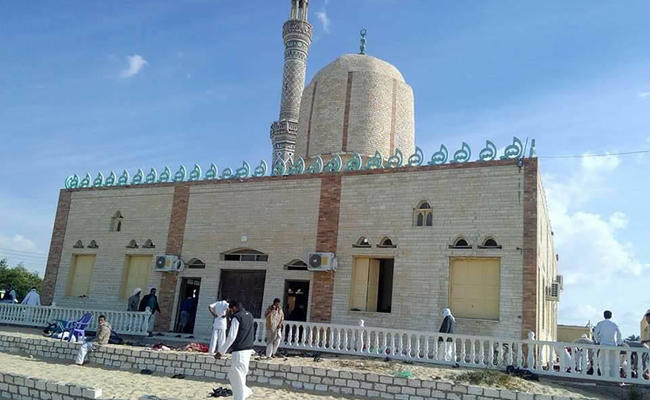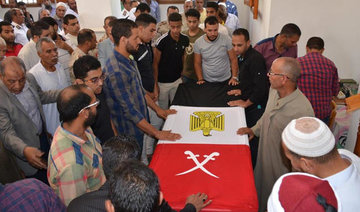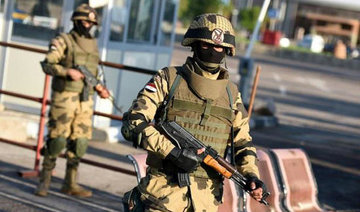CAIRO: Friday’s bomb and gun attack on a mosque in Egypt’s North Sinai province is the latest in a spate of terrorist attacks targeting the state in recent years.
The attack killed at least 250 worshippers attending Friday prayers at Al-Rawdah mosque in Bir Al-Abed, near Al-Arish city.
It is one of the deadliest attacks of its kind since an Islamist insurgency in the peninsula was stepped up in 2013.
“There are aggressions that occur on a routine basis, targeting soldiers and police officers across Egypt, but this assault targeted a mosque filled with civilians. It’s a precedent and an unusual phenomenon,” Said Sadek, a political sociology professor, told Arab News.
“The attack stands out, given the high number of casualties and the fact that it targeted a mosque. We’re used to seeing attacks on mosques in countries where sectarian strife exists, but not Egypt.”
Militants have been waging an insurgency that has killed hundreds of security forces and civilians since 2013, mostly in attacks carried out by a Daesh affiliate. The group has also increasingly carried out attacks targeting Christians.
Egyptians following up on the news of Friday’s attack expressed sorrow and anger over what they called the targeting of the “houses of God.”
“They are taking us all at a time, mosques, churches, children, women, elderly...” wrote a Twitter user.
While it is common for Egyptians to express outrage over security forces’ performance in similar terror incidents, there were mixed reactions about whether this incident reflects a security failure.
Some social media users said it was wrong to blame security forces as this attack could not have been foreseen, given that Muslims across Egypt head to mosques to perform Friday prayers every week.
But others criticized the country’s counterterror strategy, demanding that it be revised given the frequency of attacks lately.
Here is a look back at some of the major terror attacks in Egypt since 2015:
Assassination of prosecutor
Egypt’s top prosecutor, Hisham Barakat, was the most senior state official killed by militants in recent years. He was killed in a car bomb attack in 2015 on his convoy in Cairo, an operation for which Egypt blamed the Muslim Brotherhood and Gaza-based Hamas militants, though both groups denied responsibility.
Bombing outside Italian Consulate
Daesh-affiliated militants claimed responsibility for a car bomb attack outside the Italian Consulate in central Cairo in July 2015, causing major destruction to the building. The attack, which killed one and injured a few security personnel, struck one of the busiest intersections in the city.
Blasts near security building in Cairo
In August 2015, a car bomb exploded near the national security building in Shubra Al-Khaima, a neighborhood on the northern edge of the Egyptian capital. The explosion wounded six policemen and was claimed by Daesh.
Russian plane crash in Sinai
A bomb brought down a Metrojet airliner over Egypt’s Sinai desert on Oct. 31, 2015, killing all 224 people on board. Egyptian officials initially denied Daesh claims of responsibility, saying there was no evidence of terrorism.
But they later admitted that terrorists had downed the plane 23 minutes after it took off from Sharm El-Sheikh airport on its way to St. Petersburg. Daesh’s Egyptian affiliate Wilayat Sinai claimed responsibility.
El-Arish hotel attack targeting judges
Daesh’s Egyptian branch claimed responsibility for a bombing that killed at least seven people in a hotel in North Sinai in November 2015, where 50 judges were staying. The targeted judges were overseeing the second round of parliamentary elections.
Bomb blast near St. Mark’s Cathedral
In December 2016, a bomb explosion in the Coptic Christian cathedral complex in Cairo killed 25 people, mainly women. The attack, which occurred during a Sunday service, hit a chapel adjoining St. Mark’s Cathedral, the seat of Egypt’s Coptic Orthodox Church. The attack was claimed by Daesh.
Palm Sunday bombings in Tanta and Alexandria
In April 2017, two bombings targeted Coptic Christian churches on Palm Sunday in the cities of Alexandria and Tanta, killing dozens. The orchestrated attacks took place first outside St. George’s Church in the northern city of Tanta, then hours later outside St. Mark’s Coptic Orthodox Cathedral. In response, President Abdel Fattah El-Sisi said the country would form a supreme council to counter terrorism and extremism after meeting top security officials.
Gunmen attack Coptic convoy in Minya
In May 2017, masked gunmen opened fire on a convoy carrying Copts from the Upper Egypt Minya governorate to the Monastery of St. Samuel the Confessor, killing at least 28 people.
26 soldiers killed in Sinai
In July this year, the military said 26 army personnel were killed by car bombs targeting a security checkpoint near Rafah in North Sinai, in an attack claimed by Daesh that was one of the bloodiest against Egyptian security forces in years.
Attack kills 18 policemen
In September this year, 18 policemen were killed in an attack on a convoy in the Sinai Peninsula, claimed by Daesh. Militants detonated a roadside bomb near the town of El-Arish, reportedly destroying three armored vehicles and a fourth with signal-jamming equipment.
Al-Wahat police massacre
In October, 16 policemen were killed in a clash with militants in the Western Desert of Al-Wahat. The clash occurred after state security officers received a tip about a terror base 135 km from Cairo, leading to a botched raid by government forces.
























